Stephen D. Morrison's Blog, page 15
May 24, 2015
8 Incredible Karl Barth Quotes
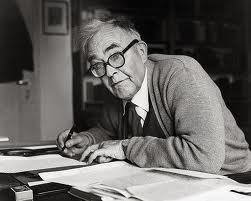 My attempt today is to summarize 800 pages of Karl Barth’s monumental work of theology on the election and command of God, which comes from book two of the volume entitled “The Doctrine of the Word of God” from the Church Dogmatics—all in eight quotes. Though it certainly goes without saying, this work is far to complex and rich a work to be summarized as such. However, I present these quotes as a taste of the brilliance this volume contains, and additionally for the purpose of compiling together my favorite quotes from the book. Enjoy! (All quotes are from the Hendrickson Publishers edition, 2010)
My attempt today is to summarize 800 pages of Karl Barth’s monumental work of theology on the election and command of God, which comes from book two of the volume entitled “The Doctrine of the Word of God” from the Church Dogmatics—all in eight quotes. Though it certainly goes without saying, this work is far to complex and rich a work to be summarized as such. However, I present these quotes as a taste of the brilliance this volume contains, and additionally for the purpose of compiling together my favorite quotes from the book. Enjoy! (All quotes are from the Hendrickson Publishers edition, 2010)
1. “The doctrine of election is the sum of the gospel because of all words that can be said or heard it is the best: that God elects man; that God is for man too the one who loves in freedom.” (P. 3)
2. “…The simplest form of the dogma may be divided at once into the two assertions that Jesus Christ is the electing God and that He is also elected man.” (p.103)
3. “Our thesis is that God’s eternal will is the election of Jesus Christ.” (p. 146)
4. “[Man] can certainly flee from God (he does so), but he cannot escape Him… He may let go of God, but God does not let go of him” (p. 317)
5. “The determination of the elect consists in the fact that he allows himself to be loved by God—to live as one from whom all eternity God in His incomprehensible and unmerited goodness did not will to renounce, and therefore will not renounce.” (p. 411)
6. “The command of God sets man free.” (p. 586)
7. “The mere fact that it takes place at all, that God stands before man as his Lord, that man’s existence can become his confrontation with God’s command, always means that God does not will to be without us, but, no matter who and what we may be, to be with us, that He Himself is always ‘God with us,’ Emmanuel.” (p. 735)
8. “In Jesus Christ He has chosen man from all eternity as His own, for life in His kingdom, to be a member of His people, His possession.” (p. 736)
Bonus quote: “At the beginning of all theological perception, research, and thought—and also of every theological statement—stands a quite specific amazement. Its lack in even the best theologian will threaten the heart of the entire enterprise, while even bad theologians are not a lost cause in their service and their duty, as long as they are still capable of amazement.” (Insights P. 3)
Like this article? Share it!
April 9, 2015
Yes! To Life (Jürgen Moltmann)
[image error]“One evening I read the following passage in Augustine’s Confessions:
But what do I love when I love you? Not the beauty of any body or the rhythm of time in its movement; not the radiance of light, so dear to our eyes; not the sweet melodies in the world of manifold sounds; not the perfume of flowers, ointments and spices; not manna and not honey; not the limbs so delightful to the body’s embrace: it is none of those things that I love when I love my God. And yet when I love my God I do indeed love a light and a sound and a perfume and a food and an embrace – a light and sound an perfume and food and embrace in my inward self. There my soul is flooded with a radiance which no space can contain; there a music sounds which time never bears away; there I smell a perfume which no wind disperses; there I taste a food that no surfeit embitters; there is an embrace which no satiety severs. It is this that I love when I love my God. (Confessions, X, 6, 8)
And that night I answered him:
When I love God I love the beauty of bodies, the rhythm of movements, the shining of eyes, the embraces, the feelings, the scents, the sounds of all this protean creation. When I love you, my God, I want to embrace it all, for I love you with all my senses in the creations of your love. In all the things that encounter me, you are waiting for me.
For a long time I looked for you within myself and crept into the shell of my soul, shielding myself with an armour of inapproachability. But you were outside – outside myself – and enticed me out of the narrowness of my heart into the broad place of love for life. So I came out of myself and found my soul in my senses, and my own self in others.
The experience of God deepens the experiences of life. It does not reduce them, for it awakens the unconditional Yes to life. The more I love God, the more I gladly exist. The more immediately and wholly I exist, the more I sense the living God, the inexhaustible source of life and eternal livingness.”
(From Jürgen Moltmann, A Broad Place: An Autobiography, P. 350)
March 9, 2015
Karl Barth on Romans 9:20
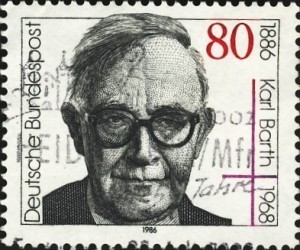 So then He has mercy on whom He desires, and He hardens whom He desires. You will say to me then, “Why does He still find fault? For who resists His will?” On the contrary, who are you, O man, who answers back to God? The thing molded will not say to the molder, “Why did you make me like this,” will it?
So then He has mercy on whom He desires, and He hardens whom He desires. You will say to me then, “Why does He still find fault? For who resists His will?” On the contrary, who are you, O man, who answers back to God? The thing molded will not say to the molder, “Why did you make me like this,” will it?
(Romans 9:18-20 NASB)
Romans 9-11 is one of the most debated passages of scripture. On one side, the Calvinist will see absolute proof in these passages for their doctrine of predestination. But Karl Barth, in his incredible Church Dogmatics II/2 provides a running exegesis of this passage. As I was reading this today, I came across a beautiful summing up of what makes Barth’s understanding of predestination so brilliant—that of bringing the discussion back to Jesus Christ alone. Here he comments on the question Paul poses in verse 19 and the counter-question in verse 20.
But it is not in respect of an indeterminate power of God that Paul’s counter-question puts man in his place. This would only give fresh vigor and a new pretext for the question of v. 19. On the contrary, the “power” of God in His dealing with man, in face of which it becomes man to be humbled, is something wholly determinate; it is settled by the determined purpose on which God has decided with respect to man in Jesus Christ. The tenor of the answer hidden in the counter-question of v. 20 is: “in any case, whether you are a friend of God like Moses or an enemy like Pharaoh, whether your name is Isaac or Ishmael, Jacob or Esau, you are the man on account of whose sin and for whose sin Jesus Christ has died on the cross for the justification of God, and for whose salvation and bliss, and for whose justification, He has been raised from the dead. ” (Rom. 4:35).
Essential, Karl Barth has taken this question in Romans 9:20, which is commonly understood as the indeterminate power of God which “puts man in his place”, and He has made it particular in the person of Jesus Christ who has suffered and died for the sake of all mankind. It is this determined purpose of God, God’s decision about mankind in Jesus Christ, God’s free-election of man in Jesus Christ, that Paul is answering the first question with His counter-question. And this is why Karl Barth’s doctrine of election is an improvement over that of the Calvinist understanding. He succeeds to bring back election as an event “in Christ”, not as an abstract happening apart from Jesus Christ. (See Eph 1:5-6) It’s essential to see that Paul has this context in mind as he writes Romans 9-11.
February 21, 2015
T. F. Torrance on the Passible Impassibility of God
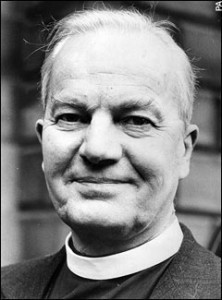 T. F. Torrance writes in dialogue with Jurgen Moltmann, towards the end of his (incredible!) work, The Christian Doctrine of God: One God Three Persons (LINK), on the tough issue of God’s Impassibility (which simply means the inability of God to suffer). In the light of the incarnation and the crucifixion of Christ, how can one still say that God is impassible?
T. F. Torrance writes in dialogue with Jurgen Moltmann, towards the end of his (incredible!) work, The Christian Doctrine of God: One God Three Persons (LINK), on the tough issue of God’s Impassibility (which simply means the inability of God to suffer). In the light of the incarnation and the crucifixion of Christ, how can one still say that God is impassible?
Jurgen Moltmann claims that this is impossible, writing that an impassible God is a “demon”. 1 But classically, especially in western theology, the impassibility of God is one of the primary attributes of Gods nature.
I have often been interested in the sort of dialogue that T. F. Torrance has had with other theologians, especially with Jurgen Moltmann. Both men have tremendously impacted my spiritual and theological perspectives. Torrance’s nuanced understanding of the impassibility of the passible God is one that I found interesting when I read it, because it gives a balanced perspective on the issue. The following quotes are from the final chapter in The Christian Doctrine of God.
Torrance begins following Cyril of Alexandria in saying that God suffered impassibly in the death of Christ, therefore calling the impassible passibility of God a paradox.
“The emphasis tended to be laid sometimes on one side of the paradox, and sometimes on the other, but Cyril was always concern not to detract either from the integrity of human nature or from the integrity of divine nature. On the one hand the notion of divine passibility would appear to call in question the steadfastness or immutability of God in face of the pressure of outside forces upon him as if he could be moved by what is other than God. On the other hand the notion of divine impassibility would evidently exclude the possibility of any real movement of God in a loving and vicarious self-identification with us in the incarnation and redemption which would posit a deep gulf between God as he is in himself and God as he is towards us. On the other hand, therefore, we cannot but hold that God is impassible in the sense that he remains eternally and changelessly the same, but on the other hand, we cannot but hold that God is passible in that what he is not by nature he became in taking upon himself ‘the form of a servant’. He became one of us and one with us in Jesus Christ within the conditions and limits of our creaturely human existence and experience in space and time, although without in any way ceasing to be God who is transcendent over all space and time. That is surely how we must think of the passibility and impassibility of God: their conjunction is as incomprehensible as the mode of the union of God and man in Christ. Just as in creation and incarnation God acted in entirely new ways while remaining unchanged in his divine nature, just as he became man without ceasing to be God and became creature without ceasing to be creator, so he became passible without ceasing to be impassible in another sense.” 2
So it seems that for Torrance the paradox of Gods impassible passibility is similar to the dual nature of Christ as wholly God and wholly man. Just as Jesus Christ is fully God and man in one person, while taking up our human flesh He remains divine, so God has become passible in Jesus Christ, while remaining eternally impassible. He therefore has assumed both natures. He has at once truly reached the human race, while nevertheless remaining truly God as He is in His eternity, unchanged and self-moved.
Torrance continues on to say the following:
“We must be quite definite about the fact that in the Lord Jesus Christ God Himself has penetrated into our suffering, our hurt, our violence, our sinful alienated humanity, our guilty condition under judgement, and even into our dereliction. ‘My God, my God, why hast thou forsaken me?’ Behind that cry of Jesus on the Cross there is a mysterious movement in the divine Trunity, a counterpoint between the pathos in the crucified Jesus and the pathos in God. The cry of Jesus in dereliction was followed by another cry, ‘Father into they hands I commend my spirit.’ There on the cross at the deepest point of our relations with God in judgement and suffering the incarnate Son of God penetrated into our pathos in such a profoundly redemptive way that in the very heart of it all, he brought his eternal serenity to bear transformingly upon our passion. Thus we cannot but say that in Christ God both suffered and did not suffer: through the eternal tranquillity of his divine impassibility he took upon himself our passibility and redeemed it.” 3
For Torrance, Jesus Christ became passible in order to redeem our our suffering with his impassibility, just as Jesus Christ at once came to redeem our fallen humanity by become sin for our sakes. If “the unassumed is the unredeemed” then this must be the case not only for our fallen humanity, but also for our suffering as human beings. God assumes in order to redeem. Therefore, Christ became passible, while at once remaining impassible. But nevertheless, He truly became passible just as He truly became man.
Notes:
see The Crucified God (LINK) ↩P. 250 ↩P. 251 ↩January 26, 2015
God in All Things
St. Hilary, the 4th century Bishop of Poitiers, writes the following:
There is no space where God is not; space does not exist apart from Him. He is in heaven, in hell, beyond the seas; dwelling in all things and enveloping all. Thus He embraces, and is embraced by, the universe, confined to no part of it but pervading all. 1
Likewise, Jürgen Moltmann writes:
‘God’s spirit fills the world and he who holds all things together knows every sound’ (Wisdom 1:7). It is therefore possible to experience God in, with and beneath each everyday experience of the world, if God is in all things, and if all things are in God, so that God himself ‘experiences’ all things in his own way. 2
In Western society there is a tendency to compartmentalize life. That is, to take life and space it out into various compartments. We take work life and separate it from home life, church life from friendship, and various other situations are often divided from each other. In doing so, we have the tendency to also take God and put Him into compartments as well. The result is the fierce division in our culture between what is “sacred” and what is “secular”. While it is important to note that there is a difference between what is sacred and what is secular, this does not mean that there is a division. God is not the world, the bible makes this clear, the pantheistic religions are proven false. But we cannot put God so far away as to say that He is not a part of the world. He is not equal to creation (e.g. God is not the trees, He isn’t “mother earth”. Earth is earth and God is God.), but at the same time, God is also not divorced from creation. God is not far away from our existence, in fact, Augustine once said that “God is nearer to me than I am to myself”. The nearness of God is sadly lost in a society which fiercely divides life into compartments.
But my hope is that we can come to learn once again that our God is Emmanuel: God with us. Life is not lived apart from God, life itself is only life if it is life in God. God is the ground of existence, the fountain of all being. Therefore, to exist is to exist in the presence of God. This nearness can be learned. We can learn to see God in all things, in the mundane and the horrific, in the happy and the problematic.
May we learn to find God in all things!
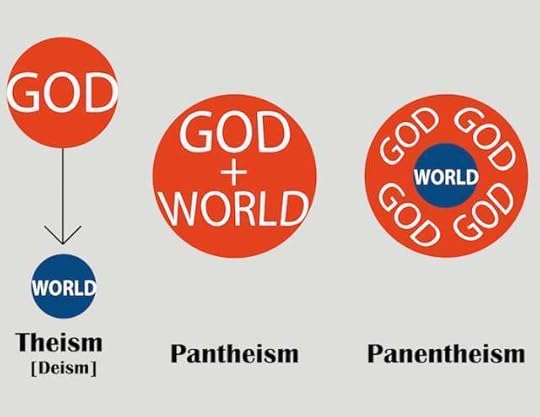
(Deism/Theism teach: God is separate from the world. Pantheism teaches: God is the world. Panentheism, however, teaches: God is in the world and the world is in God.)
Like this article? Help me expand my reach by sharing it:
Notes:
On the Trinity book I.6 ↩The Spirit of Life: A Universal Affirmation P. 34 ↩December 30, 2014
3 Keys for Building Community
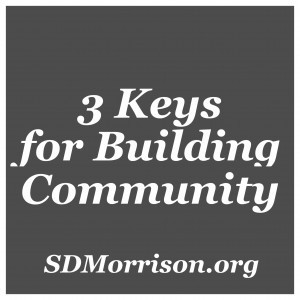 Recently I’ve been thinking about what it means to build community.
Recently I’ve been thinking about what it means to build community.
For some community means mutual habitation, a mere proximity to another individual. For others it means fellowship with those we agree with, a kind of meeting place for members of a club with a set of predetermined beliefs. But I’d argue it’s neither of these. Community is far more important and far more difficult a thing to come by. Very few people find community, that is, true, life-giving community. I’ve been lucky enough to find community in my life. Though it’s not without a price.
Today I wanted to share a few thoughts on how to build community. Many of these come from my own experience, but other sources were helpful in solidifying these experiences. Namely, two wonderful books: Life Together by Dietrich Bonhoeffer (link), and The Passion for Life by Jurgen Moltmann (The%20Passion For Life: A Messianic Lifestyle link). I recommend both.
link). I recommend both.
These three keys, for lack of a better term, are not merely ways to build community, but also ways to discover and develop community where you already are. You don’t have to go out and start a new organization to “find” community. You can build community wherever you are, discovering it in your neighbors, friends, and family. These keys, therefore, are guidelines that help build a strong, life-giving community anywhere you might be.
1. Vulnerability
C.S. Lewis is known for having said, “to love at all is to be vulnerable.” Nothing could be more true when in comes to community building. If you want to develop true community, you have to be vulnerable. You must go outside of yourself and open yourself up to another. This of course means opening yourself up to rejection, pain, and sadness. There is always risk in community. Without vulnerability you will live a non-life: a life of mere existence, and nothing more. In order to truly live, to be fully alive, you must be vulnerable and risk.
Vulnerability encourages more vulnerability. The first step in developing vulnerability around you is being vulnerable yourself. In order to open up your environment, you must begin by opening up yourself. If you want to develop a genuine community, a community without masks, the first step is to open up your heart and be vulnerable.
2. Acceptance
Jurgen Moltmann writes that “acceptance is the atmosphere of humanity.” Once vulnerability is developed, the next step is acceptance. Without acceptance vulnerability will die and the old, stale ways of being will return. Vulnerability that ends in acceptance is sustainable vulnerability. Acceptance, therefore, is essential to the development of community.
The purpose of community is intimacy. I love the definition Danny Silk gives for intimacy. He calls it “into-me-you-see”. Intimacy means vulnerability, the practice of being genuine, and the acceptance of another person. Therefore, acceptance is the next step in developing community.
On a side note, acceptance must be vulnerable acceptance. It is not conditional acceptance, but unconditional. It is therefore acceptance given to another person despite their response. It is this sort of acceptance that solidifies a community.
3. Communion
The last “key” to developing community is communion. Communion is the “common-union” of our life. It is the element of unity. Without vulnerability or acceptance, the communion of community will always be fake and superficial. But when vulnerability and acceptance are in place, communion is the final key to building a life-giving community.
But what is this “common-union” we share? In the Christian sense it is Jesus Christ, and more specifically, the cross of Jesus Christ. Jurgen Moltmann argues that we are united only when we stand together “under the cross”. Because “under the cross we all stand empty-handed”. The final element to a thriving community is the humility that comes as we collectively stand under the suffering of Jesus Christ. We stand there empty-handed, exposed, vulnerable, but wholly accepted, free, and loved. This is where community thrives and life is experienced to the fullest.
Like this article? Help me expand my reach by sharing:
November 22, 2014
68 Books I Recommend
I love reading! Reading is one of the reasons why I became an author to begin with. Books are always the first on my list of things to buy with money I receive from birthdays, or Christmas’.
I also love recommending great books to other people. The purpose of this article will be just that: to compile a massive list of authors and books in various categories that I have found enjoyable (or life changing!).
We’ll organize it like this. There will be four sections: (1) Theology, (2) general Christian, (3) fiction, and (4) bibles. Each section will be broken up into authors, and the list of their books I recommend. The first book listed from each author is the book I recommend you begin with (if you’ve never read that author before). This helps especially with difficult theologians, such as Barth, who are sometimes impossible to read if you pick up the wrong book. Most authors have multiple books listed that I recommend, I have organized their books by importance and personal enjoyment.
So without further-ado here is my list of recommendations! I hope you’ll enjoy these books as much as I have!
Leave a comment if you have any books to add, or if you like this list! :)
Theology
Thomas F. Torrance:
The Mediation of Christ (link)
Incarnation: The Person and Life of Christ (link)
Atonement: The Person and Work of Christ (link)
Trinitarian Faith: The Evangelical Theology of the Ancient Catholic Faith (link)
The Christian Doctrine of God, One Being Three Persons (link)
James B. Torrance:
Worship, Community and the Triune God of Grace (link)
C. Baxter Kruger:
Jesus and the Undoing of Adam (link)
The Shack Revisited (link)
The Great Dance (link)
God Is for Us (link)
St. Athanasius:
On the Incarnation (link)
Defense Against the Arians (link)
Life of Anthony (link)
Karl Barth:
Dogmatics in Outline (link)
Evangelical Theology: An Introduction (link)
The Humanity of God (link)
Epistle to the Romans (link)
Church Dogmatics (link)
Gottingen Dogmatics (link)
Jurgen Moltmann:
Jesus Christ For Today’s World (link)
The Crucified God (link)
God in Creation (link)
The Trinity and the Kingdom (link)
Theology of Hope (link)
The Coming of God: Christian Eschatology (link)
Dietrich Bonhoeffer:
Letters and Papers from Prison (link)
Christ the Center (link)
Irenaeus of Lyons:
Against Heresies Book III (link)
Against Heresies (link)
Hilary of Poitiers:
On the Trinity (link)
Paul Tillich:
Dynamics of Faith (link)
Wolfhart Pannenberg:
Jesus: God and Man (link)
An Introduction to Systematic Theology (link)
General Christian
Thomas Merton:
A Thomas Merton Reader (link)
The Seven Storey Mountain (link)
Thoughts in Solitude (link)
Brother Lawrence:
The Practice of the Presence of God (link)
C. S. Lewis:
The Great Divorce (link)
The Weight of Glory (link)
Mere Christianity (link)
The Four Loves (link)
Robert Farrar Capon:
Between Noon and Three (link)
Kingdom, Grace, Judgement: Paradox, Outrage, and Vindication in the Parables of Jesus (link)
The Mystery of Christ … And Why We Don’t Get It (link)
George MacDonald:
Unspoken Sermons (link)
Brian Zahnd:
A Farewell to Mars: An Evangelical Pastor’s Journey Towards the Biblical Gospel of Peace (link)
John Crowder:
Cosmos Reborn: Happy Theology on the New Creation (link)
Mystical Union (link)
Benjamin Dunn:
The Happy Gospel (link)
Fiction
George MacDonald:
Phantastes (link)
Lilith (link)
The Princess and the Goblin (link)
C. S. Lewis:
Chronicles of Narnia (link)
Parelandrea (link)
William Paul Young:
The Shack (link)
Tim Heath:
Cherry Picking (link)
Ayn Rand:
Anthem (link)
John Milton:
Paradise Lost (link)
Bibles
Reliable Translations:
New American Standard Bible (link)
English Standard Version (link)
Quotable Translations:
New International Version (link)
The Message Bible (link)
Other Interesting Translations:
J.B. Phillips (link)
Kenneth Wuest (link)
New English Bible (link)
St. Paul From the Trenches (link)
LXX Septuigent (link)
Cotton Patch Translation (link)
Like this article? Help me expand my reach by sharing:
November 10, 2014
How Jesus Read the Bible
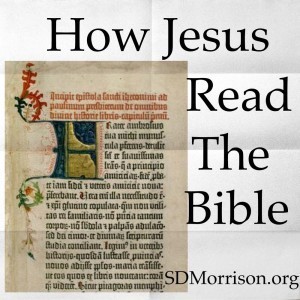 I think Jesus would read the bible differently than we do today.
I think Jesus would read the bible differently than we do today.
Although I am aware that the bible Jesus read was different from ours. Jesus read what was known as the Torah, and what we call today the Old Testament. But while this is true, we can still learn something from examining how Jesus read the Old Testament scriptures.
There are only a few examples where Jesus shows how He read the bible, but one in particular has always interested me.
In Luke 4:18, Jesus reads on the sabbath day from the scroll of Isaiah:
“‘The Spirit of the Lord is upon me, because he has anointed me to proclaim good news to the poor. He has sent me to proclaim liberty to the captives and recovering of sight to the blind, to set at liberty those who are oppressed, to proclaim the year of the Lord’s favor.'” (ESV)
It’s interesting to compare this passage with the one Jesus is quoting. The way Jesus reads the passage gives us a glimpse into how He understood the bible. He is reading from Isaiah 61:1. Read it and see if you can notice anything different:
“The Spirit of the Lord God is upon me, because the Lord has anointed me to bring good news to the poor; he has sent me to bind up the brokenhearted, to proclaim liberty to the captives, and the opening of the prison to those who are bound; to proclaim the year of the Lord’s favor, and the day of vengeance of our God.” (ESV)
When you compare the two it’s clear that Jesus intentionally left off that final statement. In Luke’s Gospel this moment signifies the beginning of Jesus’ public ministry. Jesus proclaims that this is what He is going to do, but He takes special care to leave out that final line in the verse. I think this was done intentionally.
This shows that Jesus came to proclaim the favor of God, not His vengeance. Although in fairness, it is nearly impossible to say with certainty what Jesus actually intended by leaving off this verse. But I find it interesting nonetheless. And if I am going to take a guess here, I think it would be fair to assume that Jesus left off the final portion of Isaiah’s prophecy because God is not interested in vengeance. Instead, Jesus proclaimed the favor of God, the good news that God is for mankind!
How can we learn from this example Jesus gives us?
I believe, preaching hell and sin to scare people into believing is not only a bad idea, it’s something Jesus Himself avoided. Searching the bible for verses to beat up unbelievers seems like working against Jesus. I can’t tolerate it whenever a believer uses the bible to mistreat another human being. The bible shouldn’t be a tool for abuse! Throwing shame and guilt at people has never been a very successful evangelism technique anyways.
Instead, I propose we use the bible to proclaim the wonderful news of God’s favor and grace towards humanity!
This reminds me of a great quote from Harper Lee:
“Sometimes the Bible in the hand of one man is worse than a whisky bottle in the hand of another…”
But I what to know what you think. Leave a comment below!
Like this article? Help me expand my reach by sharing:
October 30, 2014
My Book is FREE This Weekend!
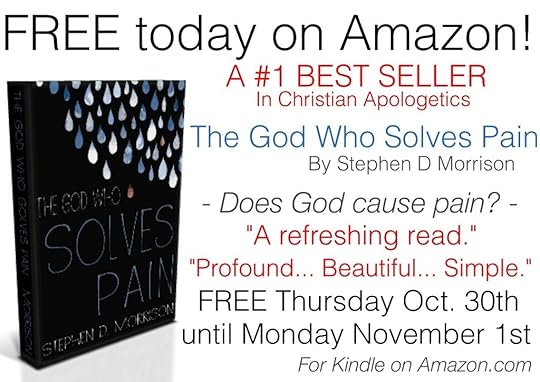
FREE right now on Amazon.com is my first book The God Who Solves Pain!
CLICK HERE
Today, in celebration of one year of writing, I’m giving away my first book for free! A year ago this month I began this blog not knowing what to expect. After nearly 30,000 total hits, I am blown away by the amount of support I’ve received from you all! Thank you so much to all of you who have read, commented on, and shared my articles over this last year. It means the world to me!
If you haven’t read my book, I hope you enjoy it! If you have read it and you liked it, it would be awesome if you’d share this link so others can read it too! http://amzn.to/1tk2cCm
I wrote The God Who Solves Pain to proclaim the good news that God is for the human race and not out to get us! I believe that far too many have been told the lie that God is testing them with pain, or punishing them with suffering. My heart in writing this book was to show that both notions are inconsistent with the person of Jesus Christ. God is good! God is for the human race! This is the simple but powerful message I hoped to convey through this book.
For the next five days (from Thursday Oct. 30th until Monday November 3rd) my book will remain free to download on Amazon. Please help me spread the word!
Some Statistics
Being the one year anniversary of this website, here are some fun statistics about how it’s been going:
124 articles published in 15 categories making up a total of around 300,000 words for the entire site!
In a year this websites received nearly 30,000 total hits, from well over 50 countries around the world!
On its most popular day this website received 2,400 views!
Coming Soon
By the end of this year the plan is to have two new books published. The first will be a full-length book on the Gospel entitled We Belong: Trinitarian Good News. This is a book that I am extremely excited about! The second book will be a shorter book, probably less than 100 pages in length, on the Holocaust. Release dates are yet to be determined.
I’m excited for what’s up ahead, and I want to thank all of you for being with me on this journey!
Cheers!
Stephen D Morrison
Like this article? Help me expand my reach by sharing:
October 28, 2014
Faith and Doubt (Friends or Foes?)
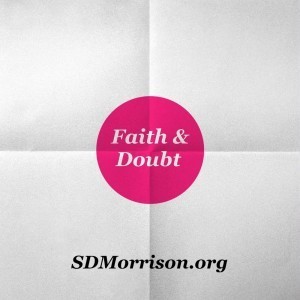 Can faith doubt, and doubt have faith? Are faith and doubt mutually exclusive?
Can faith doubt, and doubt have faith? Are faith and doubt mutually exclusive?
According to the way many Christians understand faith, the answer is no. For most today, faith is opposed to doubt and doubt is opposed to faith.
But is this really so?
I read this week a great book by Paul Tillich entitled Dynamics of Faith. What does Tillich have to say in this regard? In this enlightening book, Paul Tillich disagrees whole heartedly that faith and doubt are mutually exclusive. Instead, he argues just the opposite. Faith and doubt are inclusive.
For Tillich, faith is not “belief”, nor is it “trust”. Often, these two words are used to define faith for the modern day thinker. When someone says they have faith they often mean “belief” or “trust”. “I have faith in God” then really means “I believe/trust in God”.
“Let faith overcome your doubts” is a commonly expression. But if faith is more than simply trusting in or having belief in an object, this saying should be rethought. While faith may include belief and trust, perhaps it is not exhausted by these terms. Rather, belief and trust come as the by-product of faith.
So what is faith? Tillich defines faith as “the state of being ultimately concerned.” 1 He further writes that “an act of faith is an act of a finite being who is grasped and turned to the infinite.” 2
This understanding of faith as “ultimate concern” radically changes the nature of our original question. If faith is the ultimate concern of an individual, that which he is concerned with his entire being about, then faith is not opposed to doubt. And in fact, this ultimate concern for the infinite (faith) must include an element of uncertainty, and therefore of doubt. For the element of uncertainty comes into faith in that faith is an event which takes place between an infinite being and a finite being (between God and man). “Faith is uncertain so far as the infinite to which it is related is received by a finite being.” Writes Tillich. 3 The nature of faith is between that which is finite and fallible (human beings), and that which is infinite and infallible, (God). It therefore includes an element of uncertainty to it.
This element of uncertainty in faith cannot be removed, it can only be accepted. Therefore, faith is never without doubt.
The converse too is equally true. Doubt is never without faith because doubt is the confirmation of faith. If faith is the state of being ultimately concerned, then doubt confirms this ultimate concern in that it takes seriously the object of its concern.
Faith includes doubt, and doubt confirms faith! Faith and doubt are therefore not mutually exclusive of one another, but quite the contrary. Faith and doubt are mutually inclusive. Faith includes doubt and doubt includes faith. Polar opposites they are not.
When faith is defined as the belief in an object or set of facts, then faith is opposed to doubt. But, as Tillich argues, when faith is defined properly as the state of being ultimately concerned then doubt is included in that concern and is indeed necessary to its existence. Faith and doubt are then not opposite acts, but co-dependent acts.
After reading Tillich’s book I began another which also discusses faith and doubt, this is, the famed novel, The Brothers Karamazov by Fyodor Dostoyevsky. One of the major themes presented by Dostoyevsky in this novel is the battle of faith and doubt. Faith and doubt are presented in opposition to one another throughout the book.
This fact represents the general problem in our contemporary understanding of the nature of faith and doubt. When we think of faith, we think of belief. But this leads to an error which asserts that faith and doubt are exclusive of each other. When understood properly however, faith as ultimate concern negates this error and makes peace with doubt to such an extent that doubt is welcomed back into the definition of faith itself.
This change in definition is one I’ve pondered quite a lot since finishing Tillich’s book last week. What does this re-defing of faith mean for Christianity?
Could we begin again to take seriously our honest doubts about God, the bible, and the doctrines of the church without fearing excommunication or slander? Could we learn to be honest with each other, to stop wearing masks of perfection? If faith includes doubt, the church should become the most honest place in the world. It could become a place for the masses to voice concerns, and to share honest reflections without the fear of “loosing your salvation” or getting kicked out of church! Doubt should be permitted—even encouraged, if Tillich is correct about this re-definition of faith. This could drastically change the dynamic of Christian life as we know it today.
What other problems might this solve which we face in our society? Could the creation/evolution debate finally be put to rest? Could Atheists and Christians sit down together and share their honest doubts and take courage in their unified concern?
Perhaps all this is possible if we redefine faith in such a way. It seems to me to be a step forward for the church. In a post-enlightenment, post-kantian era of faith, perhaps Tillich is onto something drastic and revolutionary. Faith and doubt just may cease the present feud and reconcile!
What do you think?
Like this article? Help me expand my reach by sharing:
Notes:
Dynamics of Faith P. 1 ↩Ibid. P. 16 ↩Ibid. P.16 ↩


